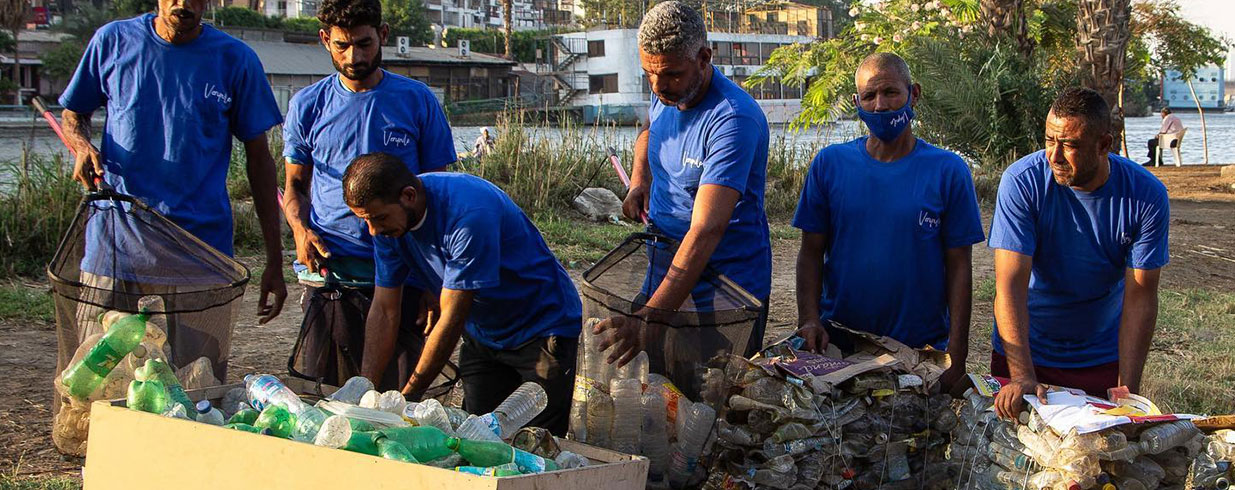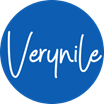VeryNile is an initiative that develops sustainable means to clean the Nile while raising awareness on the importance of protecting the environment. VeryNile interlaces social and environmental impact and develops eco-friendly solutions to remove inorganic waste from the Nile river.

Verynile initiative – Preventing marine litter and littering
OBJECTIVES
The main objective of VeryNile is to build eco-friendly communities while addressing the problem of marine litter in the Nile using socially empowering and innovative approaches.
BACKGROUND INFORMATION AND LOCATION
General information on waste management:
• 110 tonnes of recyclables removed from the Nile since 2018;
• 34 fishermen involved in waste collection from the Nile;
• 4,800 volunteers engaged in cleaning activities;
• waste is segregated and compacted in VeryNile’s Hub;
• new upcycled and recycled products are produced from the plastic waste collected from the Nile.
General information on the territory:
• Location: the Nile river
• Country: Egypt
IMPLEMENTING BODIES
VeryNile is implemented by the Egyptian social enterprise Bassita. The initiative works hand in hand with the fishermen of the Nile for the river’s cleaning, as well as with the local women of Qursaya island for the plastics’ upcycling production manufacture.
KEY STAKEHOLDERS INVOLVED
The key stakeholders involved in the implementation of the initiative’s activities include the following:
• Local community: fishermen and local women of Qursaya island;
• Private sector: 115 private companies and entities;
• Development sector: Drosos foundation and One Earth One Ocean NGO, several embassies and UN agencies;
• Governmental sector: Ministry of Environment of Egypt.
GENERAL CONTEXT
VeryNile was created in 2018 as an initiative that breaks boundaries through its wide range of ideas, strong commitment to action, and ability to bring together multi-sectoral volunteers and partners. The Nile is a symbol of Egyptian heritage and a source of life for Egypt. However, according to the World Economic Forum, it is also one of 10 rivers that contribute 90% of the litter ending up in the world’s oceans. By cleaning the Nile, raising awareness about the importance of reducing plastic consumption, and empowering local communities, VeryNile ensures that its impact is not just clear on a local and regional level, but on a global one as well. VeryNile is supported by the Ministry of Environment of Egypt. In 2021, the Ministry of Environment formalised the cleaning activities of the initiative with the signing of a protocol.
DESCRIPTION OF THE ACTIVITIES
VeryNile uses sustainable means to clean the Nile, recycles and upcycles the collected solid waste through partnerships with local stakeholders and promotes the prevention of the use of single use plastics. More specifically, the activities of VeryNile are the following:
• Cleaning of the Nile river
The cleaning activity involves the participation of fisherwomen and fishermen who work and make their livelihood on the Nile and can reach with their small boats any location on the river to collect recyclables and trash. The collected recyclables are separated and compacted in VeryNile’s Fishermen Hub, which is located on Qursaya Island, before being sold to recycling facilities to create new products.
The project empowers the marginalized community of fisherwomen and fishermen. They receive a financial incentive (per kg of trash collected), social insurance and social services, as well as environmental training and participation in workshops.
• The Nile cleaning boat
Within the framework of the main activity of VeryNile, the initiative launched the first cleaning boat in Africa in March 2021. It has been designed in Germany by the One Earth One Ocean (OEOO) NGO and constructed in Egypt. The cleaning boat has a capacity of 500 kg of solid waste collection per week. Waste is collected through the front basket and further segregated on the boat. It operates 5 days per week all around Qursaya island. The project’s implementation and operation is funded by OEOO.
• Recycling and upcycling
VeryNile recycles the collected plastic waste from the Nile extending its environmental impact and empowering communities to contribute to a solution to an environmental and health problem. The importance of this project goes beyond the creation of an innovative social model. It promotes a circular and inclusive economy that benefits the environment and underprivileged communities. While promoting waste prevention, the initiative offers incentives for various entities to clean the Nile and recycle the collected solid waste.
Within the VeryNile framework of upcycling the recyclables and creating new products 8 (eight) women from Qursaya island receive training on how to create reusable eco-friendly bags by upcycling plastic bags.
• Awareness through clean-ups
VeryNile organizes several clean-up events where volunteers gather at a predetermined location to clean the banks of the Nile. Apart from the environmental benefits, these clean up events raise awareness, engage the youth, and expose the state of the environment of the Nile. They attract media coverage, resulting in an ongoing discussion about the accumulated solid waste in the Nile and what innovative solutions can be used. Since its inception, VeryNile has engaged 4,800 volunteers in clean-up activities in Cairo, Luxor, Minya, and Qanater.
In 2020, VeryNile partnered with Zawya Cinema to create a short awareness video on the impacts of single-use plastic bags on the environment, specifically marine life. The aim was to show viewers what the causes of the problem are and how all sectors, even the cinema industry, can play a role in educating their consumers.
• Development of Social Waste Management Solutions
VeryNile has created awareness and incentives for the residents of Qursaya island to adopt new solid waste management behaviour. Rather than discarding their solid waste in the Nile, households now understand that their waste has a value and that VeryNile’s Hub on the island is a waste collection centre. The Hub is located in a two-floor facility on the island of Qursaya in central Cairo. The ground floor includes machinery for sorting and compaction.
FINANCING AND COST RECOVERY CONTEXT
VeryNile is financed through grants and sponsorships from private companies and development sectors. Moreover, it raises some revenue from selling the collected plastic waste to recycling entities and from selling the upcycled products created at the Hub’s workshop.
MAIN ACHIEVEMENTS AND RESULTS
VeryNile’s activities have contributed to the following:
• Social impact:
- 35 fishermen are involved in the initiative;
- 4,800 volunteers have been engaged so far in clean-up events, contributing to enhanced awareness of the initiative’s objectives;
- In terms of job creation: on Qursaya island the initiative employs 8 women and 10 men;
- Involvement of Qursaya residents of all ages, gender and background in environmental and social activities, improving their living areas.
• Environmental impact:
- 110 tonnes of plastic waste have been collected since 2018; 30 tonnes have been collected by fishermen in 2021;
- Upcycling and recycling of recyclables and creation of new products;
- Banning single use plastic bags from Zamalek island (150 shops started using other more eco-friendly alternatives and stopped using plastic bags).
KEY FACTORS OF SUCCESS
The main factor of success is the continuous effort of VeryNile in combining environmental and social activities, compounding thus their impact. Community engagement through the fishermen and fisherwomen and the citizens of Qursaya island plays a key role. Furthermore, the initiatives’ cooperation with the governmental sector, i.e. the Ministry of Environment allowed VeryNile to formalise its cleaning activities.
BOTTLENECKS, LIMITATIONS AND CHALLENGES
The main bottlenecks, limitations include the following:
• There is not enough infrastructure for the compression of the large amounts of plastic waste being collected;
• There are no recycling entities in place for the valorised plastic waste purchase;
• There is lack of funds to support the project’s expansion, as more recycling Hubs should be created along the river. Plastic is collected from across the Nile and transported to the Hub located in Qursaya instead of potential nearer ones.
• Low awareness within the society of the concept and significance of the 3Rs (Reduce, Reuse, Recycle).
• Poor implementation of sustained waste management program across the different governorates of Egypt.
LESSONS LEARNED AND REPLICABILITY
Through VeryNile large amounts of plastic waste are recycled and upcycled, and new jobs created. The initiative is easily replicable in similar rivers or areas that are heavily polluted by plastic waste. Similar efforts should realistically address the lack of awareness of the general public and therefore have a strong campaign component. Sustained funding is another challenge combined with potential limited access to recycling markets.
REFERENCES, LINKS TO FURTHER INFORMATION
Key information
Topic: cleaning, recycling, preventing
Waste fraction: plastic waste
Target group: fishermen, fisherwomen, other communities
Instruments: infrastructure, social inclusion, awareness campaigns
Date of the implementation
Since 2018
